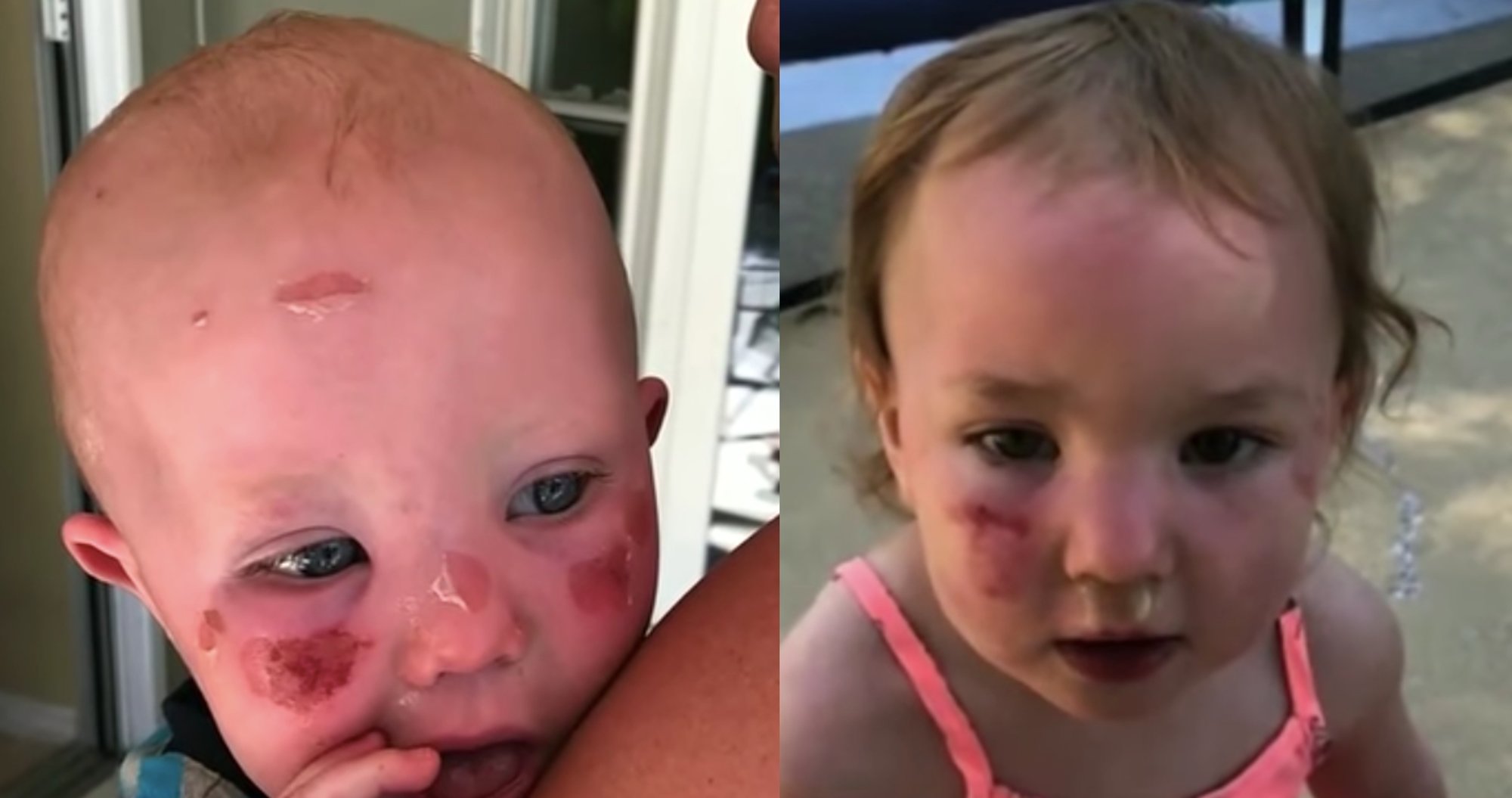
It's officially summer — and you know what that means. 'Tis the season for pool parties, family vacays, and slathering kiddos in ridiculous amounts of sunblock every 30 minutes. That's exactly what Florida mom Jade Gribble was doing when she and her four kids went to visit her twin sister one weekend in April. But according to ABC Action News, Gribble was shocked when blotches on their skin started to turn red and then blister just hours later.
Gribble told the outlet that she thought she was doing the right thing when she applied Havana SPF 50 to her children at the beach.
"I thought it would be safe," said the mom of four. Although her older children seemed fine, in just a few hours her youngest two — 1-year-old Talon and 3-year-old Tally — developed deep red patches on their skin.
Overnight, those patches turned to painful blisters, and Gribble rushed them to the emergency room.
In the ER, the mom was shocked when doctors told her what the red marks were: chemical burns -- likely caused by the sunscreen she'd applied.
"It was overwhelming," she recalled, "and I was [rack]ing my head, like 'What did I do wrong?'"
During their own investigation, Action News brought photos of the children's burns — as well as the sunscreen itself — to three dermatologists. One of them was Dr. Maria Hicks, who told Action News: “When you see that, you have a dermatitis which is an inflammation of the skin.”
The likely culprit? After examining the sunscreen ingredients, Hicks said oxybenzone and acrylates were probably to blame — two common sunscreen ingredients that have been known to cause skin irritation in some people but not all.
Sunscreen regulation has been a hot-button issue for years, as more studies have been conducted to determine the safety of popular formulas.
In February, the FDA issued new sunscreen guidelines, claiming that many of the ingredients commonly found in over-the-counter formulas may not be as safe as we once thought. Officials also called for more research to be done on many ingredients we just don't know enough about.
After closely studying 16 chemicals commonly used as the main ingredient in sunscreen, only two were marked safe, according to Reuters: zinc oxide and titanium dioxide.
Since those findings, dermatologists, the FDA, and other major health officials have been urging people — and especially parents — to use mineral-based sunscreens to be on the safe side.
Mineral-based sunscreens are basically just that: sunscreens that use minerals (as opposed to non-natural chemicals) as their active ingredients.
Although chemical-based sunscreens are definitely still effective in blocking out the sun's harmful UV rays, there's one main difference: The active ingredients in mineral sunscreens sit on top of the skin, whereas the chemical compounds in other sunscreens absorb into it. This can cause irritation and discomfort, according to Mustela, but there are also other questions of health safety, because these chemicals can also trickle into your bloodstream (even if only in trace amounts).
If this news has you frantically running to your medicine cabinet to throw out every sunscreen you own ... honestly, SAME.
But some experts say we might not want to panic just yet.
The New York Post recently spoke with New York dermatologist Dr. Michelle Green, who said mineral sunscreen is definitely preferred — especially for those younger than 21– but noted that it's important to remember even a chemical-based sunscreen is safer than none at all.
“Should you throw it away? No, you absolutely need it to protect you against skin cancer,” she told the paper. “On average, a person’s risk of melanoma doubles if he or she has had more than five sunburns.”
If you're still looking to toss yours or just want to know what the best sunscreen options are, the Environmental Working Group released its annual guide to safe sunscreens just last month. Browse the guide to find a sunscreen that's right for you and your family.
As for Gribble, it doesn't appear she's taking legal action against the sunscreen manufacturer. She does hope her story will warn other parents.
In the meantime, Matt DeFebo, CEO for Havana Sun, issued a comment on the incident, as well as an apology:
“We deeply regret that a Havana Sun customer and her two children had an unpleasant experience with our SPF 50 Spray. All of our products are developed and manufactured in compliance with FDA sunscreen regulations, which include appropriate testing to insure product safety and efficacy. While we are a relatively new company, we have sold several thousand bottles of this product without receiving any complaints. However, even following all of the FDA mandates, it is highly unlikely that any sunscreen product will not cause an unfavorable skin reaction with at least a few individuals. Without having additional information regarding the usage circumstances of the family that experienced this issue, the storage conditions of the product after it left our control or a sample of the exact product they used, it is not possible for us to comment further on this particular instance.”




